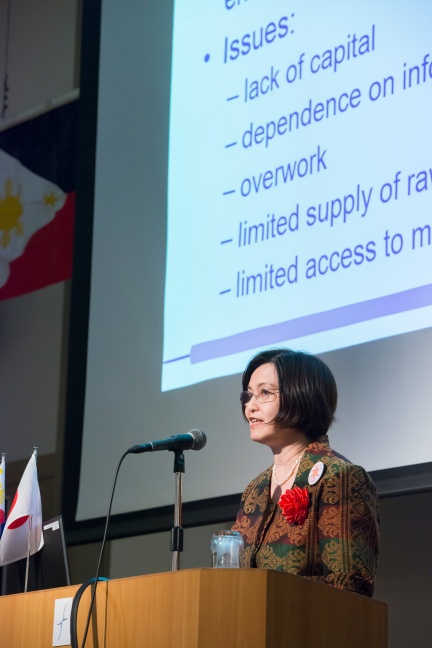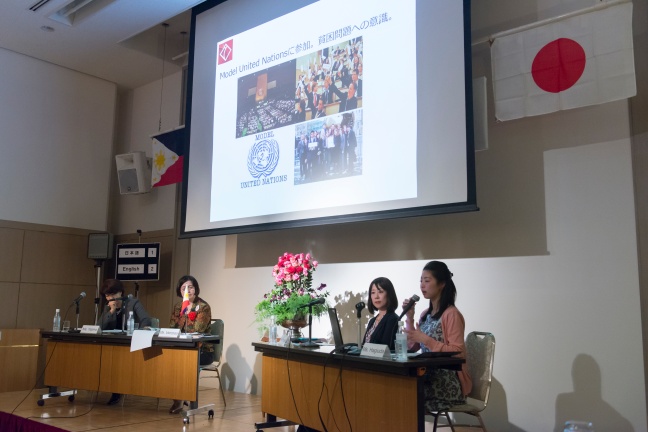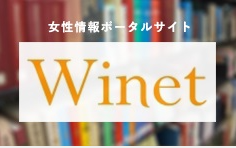International Cooperation
- HOME
- International Cooperation
- NWEC Global Seminar
- FY2015 International Symposium: Gender Equality and Women's Empowerment
NWEC Global Seminar
- Event Report
-
FY2015 International Symposium: Gender Equality and Women's Empowerment
Date:February 12, 2016
Place:Shufukaikan Plaza f in Chiyoda-ku, Tokyo /
The 2015 NWEC International Symposium was held at Shufukaikan Plaza f in Chiyoda-ku, Tokyo on February 12, 2016 around the theme: Gender Equality and Women’s Economic Empowerment. Approximately 70 people from Japan and abroad attended this year’s symposium and lively discussion ensued.
 1. Keynote address (Ms. Emmeline L. Verzosa)
1. Keynote address (Ms. Emmeline L. Verzosa)
The keynote address in Part I was presented by Ms. Emmeline L. Verzosa, Executive Director, Philippine Commission on Women, Office of the President, who gave a detailed report entitled ”Synergizing Gender-responsive Actions for Women’s Economic Empowerment in the Philippines.
The report, which described concrete examples of how the Philippine Commission on Women, with the support of the government of Canada, implemented the GREAT Women Project throughout the Philippines, offered a good opportunity for everyone to think about how Japan, where women’s participation in economic fields remains inadequate, should approach this issue.
GREAT stands for Gender Responsive Economic Actions for the Transformation of Women, and the project sought to synergize the activities of economic, government and private organizations. It is notable for its role in creating gender-responsive work and employment environments conducive to women’s economic empowerment through improved access to technical and business training, innovation in technology, resources, facilities, packaging, and markets.
To sustain and expand the gains of this project, Ms. Verzosa offered the following suggestions:
1) Provide capacity building and technical assistance on Gender and Development, and Women’s Economic Empowerment to various agencies at all levels;
2) Establish associations or cooperatives for women micro-entrepreneurs;
3) Strengthen partnerships with the private sector to improve product quality and expand marketing channels;
4) Encourage government, non-government and other organizations to offer programs and support services for women migrant workers, and respond to their needs;
5) Establish and improve monitoring mechanisms to check whether women aspiring toward economic empowerment have assured access to capital and finance, markets, capacity building and state-of-the-art technology.
Ms. Verzosa closed her strong message to the audience by concluding that the key to realizing women’s economic empowerment lay in synergized efforts among relevant organizations, and establishing good gender-sensitive governance.
 2. Panel discussion
2. Panel discussion
The panel discussion on women’s entrepreneurship held in Part II comprised animated reports and discussion. In a report entitled: Developing Women’s Capacity for Growth and Change, Fumiyo Harada, a financial specialist active in Asia, described initiatives being taken by the Development Bank of Japan to support development of women entrepreneurs. Megumi Hagiuda, a young entrepreneur, then discussed the challenges being made by her shop “Afrika Rose” in a report entitled: Create Jobs by Kenyan Roses.
Both reports offered straightforward yet detailed accounts of the development of women’s ventures - how they were supported and managed, the services and products involved, and the challenges they encountered - and clearly conveyed the difficulties and joys of entrepreneurship.
Explaining that the Development Bank of Japan was started as a national bank in 1951 to promote industrial recovery after World War II, Ms. Harada elaborated on both why the bank had begun supporting women entrepreneurs, and the selection process and criteria used to screen applications for venture support projects. She also offered convincing explanations for the problems with many venture applications, saying some applications were difficult to adopt because either production wasn’t feasible despite having an interesting concept or the applicant was too emotionally involved.
Ms. Hagiuda explained that rather than simply providing “support” for a developing country, the import and sale of Kenyan roses had resulted a win-win relationship for both Kenya and Japanese consumers, and impressed the audience with her vivid account of what this venture had involved, including both the mishaps and the surprises. The symposium venue was decorated with exquisite roses sent directly from Kenya.
Facilitating the discussion, Yoko Yajima, an expert in diversity management and a principal consultant at Mitsubishi UFJ Research & Consulting, did an excellent job of moderating between the support provider and recipient sides, and deepening discussion into what is needed to promote women’s empowerment. The keynote speaker, Ms. Verzosa, also participated in the discussion and heated debate on matters concerning women’s economic empowerment ensued.
These lectures and discussion ensured the symposium offered a meaningful forum for clarifying what is needed to further advance women’s empowerment in both the Philippines and Japan, and the way forward in Japan, where the Law to Promote the Role of Women in the Workplace and the Fourth Basic Plan for Gender Equality have been adopted.
In the question and answer session, questions about issues such as when women in the Philippines had begun to enter the workforce and how the government was responding to women migrant workers received a thorough explanation of historic circumstances surrounding women’s advancement from the beginning of the 20th century.
In Part II, in addition to numerous questions about rose cultivation in Africa fielded by the audience, a lively discussion developed around the forward looking outlook that although it had been difficult for Japanese women to start new businesses in the past, they had begun to accumulate knowhow and an environment conducive to starting and sustaining new businesses was becoming established.
<Past International Symposium>
International Cooperation
- International Seminar
- FY2019 Seminar for Gender Equality Officers and Women Leaders in the Asia Region
- FY2018 Seminar for Gender Equality Officers and Women Leaders in the Asia Region
- FY2017 Seminar for Gender Equality Officers and Women Leaders in the Asia Region
- FY2016 Seminar for Gender Equality Officers and Women Leaders in the Asia Region
- FY2015 Seminar for Gender Equality Officers and Women Leaders in the Asia Pacific Region
- FY2014 Seminar for Gender Equality Officers and Women Leaders in the Asia Pacific Region
- FY2013 Seminar for Gender Equality Officers and Women Leaders in the Asia Pacific Region
- FY2012 Seminar for Gender Equality Officers and Women Leaders in the Asia Pacific Region
- FY2011 Seminar for Gender Equality Officer and Women Leaders in the Asia Pacific Region
- FY2010 Empowerment Seminar for Women Leaders in the Asia Pacific Region
- FY2009 Empowerment Seminar for Women Leaders in the Asia Pacific Region Final Report
- FY2008 Empowerment Seminar for Women Leaders in the Asia Pacific Region
- FY2007 Empowerment Seminar for Women Leaders in the Asia Pacific Region
- FY2006 Empowerment Seminar for Women Leaders in the Asia Pacific Region
- NWEC Global Seminar
- FY2025 NWEC Global Seminar: Addressing Technology-Facilitated Gender Based Violence (TFGBV): Approaches to Eradicate the Invisible Harm
- FY2024 NWEC Global Seminar: Gender Equality and Care
- FY2023 NWEC Global Seminar: Gender Mainstreaming & Strengthening Institutional Mechanism with Gender Perspective
- FY2022 NWEC Global Seminar: Does Digital Technology Advance Gender Equality?
- FY2021 NWEC Global Seminar: Combating Gender-Based Violence – “Building Back Better” from the Covid-19 Crisis
- FY2020 NWEC Global Seminar: Covid-19 and Gender
- FY2019 NWEC Global Seminar: Gender and Media
- FY2018 NWEC Global Seminar: Promotion of the Advancement of Women - What Japan can learn from Iceland about Gender Equality?
- FY2017 NWEC Global Seminar: Promotion for Advancement of Women Lessons from Germany
- FY2016 NWEC Global Seminar: Promotion for Advancement of Women –Lessons from Europe
- FY2015 International Symposium: Gender Equality and Women's Empowerment
- FY2014 International Symposium: Keys to Diversity and Women's Leadership
- FY2013 NWEC International Symposium:Gender Equality for Men
- FY2012 NWEC International Symposium:To Make a Society without Violence against Women a Reality
- FY2011 NWEC International Symposium
- FY2010 International Forum for Women's Empowerment
- FY2009 International Forum for Women's Empowerment
- FY2008 International Forum for Women's Empowerment Final Report3
- FY2008 International Forum for Women's Empowerment Final Report2
- FY2008 International Forum for Women's Empowerment Final Report1
- Cooperation with JICA
- FY2025 Knowledge Co-Creation Program (KCCP): "Promotion of Global Networking on Anti-Trafficking in Persons"
- FY2025 Knowledge Co-Creation Program "Eradicating Sexual and Gender-Based Violence (SGBV)"
- FY2025 Knowledge Co-Creation Program: Bangladesh “Strengthening Capacity to Address Gender-Based Violence"
- FY2024 Knowledge Co-Creation Program on "Promotion of Global Networking on Anti-Trafficking in Persons"
- FY2024 Knowledge Co-Creation Program "Eradicating Sexual and Gender-Based Violence (SGBV)"
- FY2023 Knowledge Co-creation Program "Promotion of Networking among ASEAN Countries on Anti-Trafficking in Persons”
- FY2023 Knowledge Co-Creation Program "Eradicating Sexual and Gender-Based Violence (SGBV)"
- FY2022 Knowledge Co-creation Program "Promotion of Networking among ASEAN Countries on Anti-Trafficking in Persons”
- FY2022 Knowledge Co-Creation Program "Eradicating Sexual and Gender-Based Violence (SGBV)"
- FY2021 Knowledge Co-creation Program "Promotion of Networking among ASEAN Countries on Anti-Trafficking in Persons”
- FY2020 Knowledge Co-creation Program "Promotion of Networking among ASEAN Countries on Anti-Trafficking in Persons”
- FY2019 Knowledge Co-creation Program "Promotion of Networking among ASEAN Countries on Anti-Trafficking in Persons”
- FY2018 Knowledge Co-creation Program "Promotion of Networking among ASEAN Countries on Anti-Trafficking in Persons”
- Issue-specific Training “Seminar on Promotiom of Networking among ASEAN Countries on Anti-Trafficking in Persons”
- Basic Information-Gathering Survey/Workshop Seminar on the Economic Independence for Women in Central America and the Caribbean (El Salvador/Dominican Republic)
- Regional Gender Seminar in Central and South America
- 2015 Issue-specific Training "Seminar on Promotion of Networking among Asian Countries on Anti-Trafficking in Persons"
- Seminar on the Promotion of Education for Girls and Women II
- International Conference/International Exchange
- Online meeting with Seisen International School elementary students
- Visitor: Mansfield Fellows
- Visitor:JICA Knowledge Co-Creation Program (KCCP) on "Women's Empowerment through Business for Central American Integration System (SICA) Member Countries"
- The 68th Session of the Commission on the Status of Women
- Visitor: Madam Sustjie Mbumba, First Lady of the Republic of Namibia
- Workshop of commemorating the donation of the Beate Shirota Gordon archive materials
- Meeting with Korean Women’s Development Institute (KWDI)
- The Coalition of Finnish Women's Associations (NYTKIS) Secretary General Ms. KAKKOLA’s Courtesy Call to Foreign Minister KAMIKAWA
- The Coalition of Finnish Women's Associations (NYTKIS) Secretary General Ms. KAKKOLA’s Japan Visit Program
- The 67th Session of the Commission on the Status of Women
- NGO CSW67 Forum
- Webinar with Korean Women’s Development Institute (KWDI)
- The 66th Session of the Commission on the Status of Women (Hybrid format)
- Online meeting with international graduate students from the Appropriate Technology course at the University of Tsukuba
- The 65th session of the Commission on the Status of Women
- Lecture "The Beate Sirota Gordon Archives at Mills College"
- Participation in 2nd AGenT
- The 64th session of the Commission on the Status of Women
- Dr. Wang from National Taiwan University visits NWEC
- Japan Network of Women Engineers and Scientists and The Japan Inter-Society Liaison Association Committee for Promoting Equal Participation of Men and Women in Science and Engineering: 9th Japan Korea China Women Leaders Forum for Science & Technology
- Researcher from the KWDI visits NWEC
- Visit by a delegation from the Socialist Republic of Vietnam Ministry of National Defense
- Briefing on the Reykjavik Index for Leadership
- Women's Archives Center Exhibition "Beate Sirota Gordon and gender equality in Japanese Constitution"
- Visit from the Guangxi Women’s Federation
- Participation in the 63rd Session of the Commission on the Status of Women
- 7th Global Forum on Gender Statistics
- FY2018 International Symposium hosted by Korean Institute for Gender Equality Promotion and Education “Gender Equality at Schools”
- Visit from All-China Women’s Federation(ACWF)
- Participation in the 62nd Session of the Commission on the Status of Women
- The 14th KIGEPE International Symposium “Empowering Women’s Leadership: expanding influence and innovation”
- Participation in the 61st Session of the Commission on the Status of Women
- Visit from the Batis Center for Women
- 2011 Asia Women Eco-Science Forum (a forum of science and engineering leaders in Japan, China and Korea)
- The 60th Session of the Commission on the Status of Women
- The 59th Session of the United Nations Commission on the Status of Women
- The 58th Commission on the Status of Women
- The 57th Session of the United Nations Commission on the Status of Women
- International Symposium: Gender Awareness Education for Sustainable Development
- Thirtieth Anniversary Programs
- Attendance at the Ceremony Commemorating the 25th Anniversary of the Korean Women’s Development Institute (KWDI)
- Japanese-Filipino children (JFC)* from the Philippines-based NGO “DAWN” visit the Center
- Visitors from Abroad to NWEC
- Research report on Multicultural Family Support in South Korea
- Workshop on Gender and Education: Life-long Learning for Women’s Empowerment
- Lecture Delivered by a Visiting Researcher
- Connections: Bringing Together the Next Generation of Women Leaders in Science, Technology, Engineering and Mathematics
- Conclusion of Memorandum of Understanding on Exchange and Cooperation with the Ministry of Women's Affairs, Royal Government of Cambodia
- Visit to Japan by the Minister of Women’s Affairs of the Royal Government of Cambodia
- KIGEPE Delegation Visit
- Officials of Ministry of Information and Communications of the Socialist Republic of Vietnam visited NWEC
- The 56th Commission on the Status of Women
- Dr. Barker's visit
- Multidisciplinary Intellectual Exchange for Women Leaders from the United States, Japan, South Korea and the Philippines
- Courtesy visit to University of Hawai`i
- Delegation of Board for the Advancement of Women, Ministry of Finance of the Socialist Republic of Vietnam visited NWEC
- Visit Korean Women's Development Institute (KWDI)
- Report on Participation in the 5th World Social Forum on Migration
- A group led by the Vice President of the Korean Women's Development Institute visited NWEC
- A disaster management specialist from India visits the Center
- Visit to the Korean Institute for Gender Equality Promotion & Education (KIGEPE) and others
- Secretary of State, Ministry of Justice, Kingdom of Cambodia visited NWEC
- Research conducted in the Republic of the Philippines
- Research on the Comparative Study of the Gender Equality Policy in Southeast Asian Countries in the Kingdom of Cambodia
- Ochanomizu University and A Canadian Women’s Study Researcher visited NWEC
- Aigyung Yang, Research Fellow and Former Director of Strategy Board for Women Friendly Policies of the Korean Women's Development Institute (KWDI) Visits NWEC
- Delegation of the Ministry of Defense of the Socialist Republic of Vietnam visited NWEC
- Delegation from the Women and Development Center, of the Vietnam Women's Union, Visited NWEC
- The "7th Asia-Pacific Forum on Development and Gender" was held in Seoul, South Korea
- HOME
- International Cooperation
- NWEC Global Seminar
- NWEC Global Seminar
- FY2015 International Symposium: Gender Equality and Women's Empowerment


